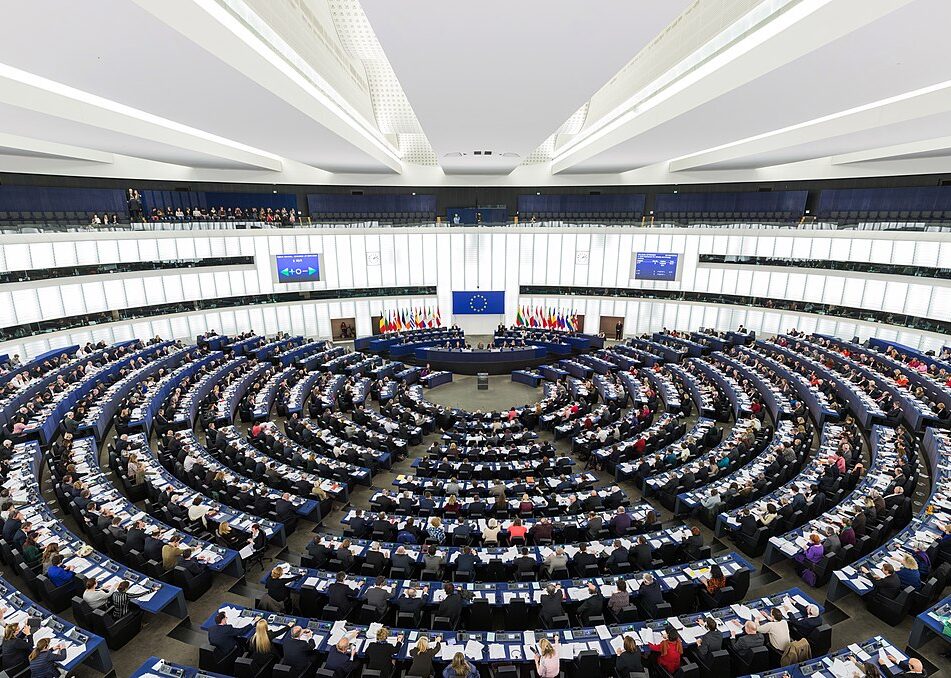Prof. Legutko: “Europe is consistently violating fundamental principles”

“We entered the EU with the belief that Poland and other countries in our region would gain in strength: we would be sitting together at the European table, and the good people of Western Europe would help us; once that happened, we would begin to play a bigger role. Meanwhile, the Western side looked at us as a problem, as a group of countries that were not only backward, but also unpredictable and therefore needed to be controlled” – says Prof. Ryszard Legutko, philosopher and Law and Justice MEP.
PAWEŁ CHMIELEWSKI: In his book “The Fourth Industrial Revolution,” published a few years before the pandemic, Klaus Schwab, president of the World Economic Forum, predicted the inevitable twilight of nation-states. Doesn’t the development of the European Union prove that this vision is indeed gradually being fulfilled?
PROF. RYSZARD LEGUTKO: When the process of European integration was set in motion, Konrad Adenauer said that in a few decades there would be no more nation-states. However, even more years have passed, and nation-states refuse to disappear. After the War, it was thought that this process would happen on its own. There was a sense of general crisis and collapse in Germany and France. Today, no one is talking about the spontaneous disappearance of nation-states and the spontaneous formation of a European demos in their place, despite the fact that we have a cosmopolitan mass culture. Rather, one now hears about the planned liquidation of nation-states. It is astonishing that the political elites of Western European countries, which have strong political sovereignty, maintain this rhetoric all the time. While in the case of France and Germany it may be thought that the idea is to capture the process for the purpose of strengthening their own state, smaller countries like Belgium and the Netherlands may be hoping for a “close cousin” role. In the case of Eastern Europe, there is no chance of even such a role. If the plan to abolish nation-states comes to fruition, we will not be cousins, but residents.
Perhaps in Western Europe this rhetoric is meant to lull the vigilance of societies similar to Poland’s and persuade them to support political forces reluctant to the nation-state, thus allowing the West to increase its influence?
To some extent, this is indeed the case. We entered the EU with the belief that Poland and other countries in our region would gain in strength: we would be sitting together at the European table, and the good people of Western Europe would help us; once that happened, we would begin to play a bigger role. Meanwhile, the Western side looked at us as a problem, as a group of countries that were not only backward, but also unpredictable and therefore needed to be controlled. This led to increased political ambitions in the West.
This would assume that these ambitions were ever so slightly off.
I’m thinking of the European institutions. They wanted to strengthen themselves thanks to us. After all, they could not improve their position at the expense of France, Germany, Italy or, at the time, England; that would have been incredibly difficult. In contrast, in relation to the countries of Eastern Europe – by all means. After all, a large part of the populations of Eastern European countries themselves wanted to be taken under such wings. If the European institutions now achieve a victory over sovereigntist tendencies in Eastern Europe, it will be their great triumph. They are enormously interested in pacifying our countries. For not only will they strengthen themselves politically, but they will also sweep away what is perceived as anachronistic – all those conservative and nationalist attitudes that are supposed to stem from backwardness.
Throughout the years, right-wing politicians who favor Poland’s presence in the Union have talked about its transformation. We have also heard this repeatedly from the Law and Justice Party.

These are two issues. One concerns the very beginning of joining the Union. We foolishly believed at the time – I say we, because I also made this mistake at the time – that by entering the Union as a kind of journeyman, we would very quickly apprentice ourselves and would soon be among the managers. We also imagined that the Union is a place where countries share experiences, so we thought that we would also bring something, such as our Catholicism, our attachment to history, because, after all, Western Europe has lost its soul, and we can give it to it. The Federalist slogan “Donner une âme à l’Europe” [“Give Europe a soul”] we interpreted in our own way, that is, as a partial re-Christianization of the Union. This was extreme naiveté – and naiveté at the level of political logic, as well as bad recognition of what Europe constituted at the time. But this is a past problem. Today, another issue is relevant – whether the conservative side in the Union can be strengthened, and here the game is still on.
German Chancellor Olaf Scholz recently proposed expanding the Union to include the Western Balkan states and eliminating unanimity in the EU Council. You have referred to the scenario for implementing these ideas as finis Poloniae. Does this mean that today you no longer believe in the possibility of transforming the EU at all?
No, with the current state of affairs, there can be no reform. Why would a monopoly holding full power seek reform? In order for reform to occur, a minority blocking certain changes must be built. Therefore, the principle of unanimity is crucial. If the vote to eliminate unanimity is sucessful, then we indeed have finis Poloniae.
The question is whether there will be forces ready to fight a real battle to stop this path. In your opinion, is there awareness in the United Right fraction that the Union’s main players will not renounce their intentions to implement federalization plans that promote themselves?
I think there is. For a long time there was a belief that it was possible to negotiate on these issues. It was known, of course, that there was a group holding power in Europe, but it was thought that it was possible to reach an agreement on the basis of standard political or trade negotiations. It was difficult for some politicians and columnists on the right to recognize that this Western Europe on which we have tried to model ourselves for centuries, and which is still for many a showcase of civilization, order and prosperity – that this Europe notoriously violates basic principles. It is not at all simple to come to such a conclusion and accept it internally.
The current state of affairs in no small part seems to indicate that those who opted for Poland’s rather thoughtless entry into the EU simply made a political mistake. Couldn’t it have been avoided?
Well, now we are wise after the loss. I remember what it was like when communism was collapsing. For us, Europe was a great culture – and this culture, we imagined, is also reflected in the Union. This fairy-tale image of Europe was false, and politically damaging. The history of Europe in the last hundred-plus years has been two world wars, the creation of totalitarian systems, both conceptual and real, the accommodation of the West first to National Socialism and later to Communism, a whole series of deceptions, lies, and cowardice, of which Poland was a victim. Finally, the sexual revolution, which wreaked havoc in the public, cultural and social spheres. We somehow did not want to remember this. Rather, we thought, to put it simply, Shakespeare, Goethe, Homer, Bach…And given that a huge part of the nation wanted to become part of a Western organization identified with democracy and prosperity, it was difficult to make a different decision. Let’s also remember that the Union of those years was the Union before Lisbon and its consequences.
What if the EU today did not promote leftist ideologies? Should Poland get involved in the federalist project if, to use a familiar term, the prospect of its “re-Christianization” was becoming a reality?
I don’t think that federalist tendencies would prevail in such a hypothetical scenario as this one. The conservative tradition is not so constructivist. Of course, the English had their empire, but it was a British empire, not a European one…
…but the main constitutive force of the Union, Germany has a long tradition of imperial thinking, not only imperial, but also Prussian. To some extent, this is independent of ideology, so it is also possible in a more right-wing perspective.
Undoubtedly. However, it seems to me that conservative emotions and inclinations today are not so easy to plug into universalist constructs, although I am not saying that it would be impossible. However, if one of the characteristics of conservatism is the defense of identity, and identity is linked to language, to continuity, then it is not so easy to engage in a common enterprise that would be more than some kind of economic venture.
However, certain European right-wing circles seem to be keenly interested in, for example, Alexander Dugin’s Great Awakening project, the creation of a European empire with a German-Russian dominance, with conservative characteristics. In Germany, the AfD, which some in Poland would like to cooperate with, is close to this. Let me return to the question: Would such federalism, in a right-wing EU, be reasonable?
This project does not realistically exist now, so I stress that the matter is strongly hypothetical. However, if you want my opinion, the answer is no. Security and freedom depend on our own control over the mechanisms that can guarantee them. Of course, we can screw it all up and inflict unpleasant consequences on ourselves, but that will be our decision. If we give up power and enter any supranational organism, any control, accountability, ability to hold ourselves accountable – all this will be very out of touch. No, this is not the right way. I wouldn’t feel comfortable even in a conservative European Parliament. Besides, in a conservative Europe there would be no such parliament.
So, does the future of Poland lie solely within the framework of a sovereign nation-state?
Sovereignty is a fundamental principle. The state either exists or it does not. Of course, sovereignty is never complete. When we sign other treaties, they limit us; this can sometimes be quite profound. Still, there is a “free exit” option. In contrast, in such supranational centralist structures, there is no “free exit.” That is why I can perfectly imagine Poland being part of some kind of Europe of homelands, such – with some changes – a pre-Maastricht Treaty integrated structure. This is something I can consider. A political union? – no. The same goes for a monetary union. What happened in Maastricht is a disastrous direction.
For the “free exit” option to be viable, it must be accompanied by discussion. In the United Right, Polexit is still not on the agenda for discussion. Is it just about voter consideration or is it a strategic direction?
Polexit does not exist as a viable political idea. No one in the United Right is considering it, and not at all for lack of boldness. First, there is no public consent for such a move, which already makes the whole issue pointless. Second, currently, it is impossible to work out a viable strategy of action after a hypothetical exit from the Union; we do not have a Polish Commonwealth, nor are we strong enough and attractive enough as a partner for new agreements with other countries. Third, and finally, absorbing our minds with a hypothetical Polexit distracts us from keeping an eye on the current situation, because it can cause a false belief that leaving the Union will take care of everything. It is more rational – though extremely difficult – to act to break the current political monopoly in the Union.
Since Russia’s aggression against Ukraine, we’ve seen some movement toward tightening integration in our region, with the goal of building a more solid anti-Russian front. To any Pole, this brings to mind pre-Partition times. Perhaps, then, our future lies not so much within the framework of a nation-state, but in a union – a regional union of sorts?
I would like to see closer political cooperation in our region. While Western Europe as a whole appears quite unambiguously in comparison to Eastern Europe, Eastern Europe is divided and does not want to act together: because it is weaker, because the countries are small, they do not want to antagonize, there are historical backstories, old animosities, resentments. For me, the dream scenario, maybe not final, but for the coming decades, is precisely a close alliance of eastern and central Europe – central, because I would also include countries such as Romania, Bulgaria, and Croatia. I would like to see something like a united front succeed. It would be very good if Eastern Europe would act more in solidarity – although not as a unified entity, because that is impossible and not recommended, but in a far-reaching coordination of activities – because we have common interests anyway. The problem, however, is that there are strong submissive parties in these countries. Poland is the best example of this: we have a third of the population that clearly demands the surrender of independence.
And it finds politicians willing to implement these demands.
You know, this always amazes me. Because politics is an activity that seeks to gain more power. Power is needed by some to enrich themselves, by others to act for the benefit of the homeland. In contrast, that side in Poland wants power in order to give that power away. This is a ludicrous version of politics. When I hear that they agree with the concept to abolish the principle of unanimity… What would Poland look like then? Unfortunately, the fact that this pathological trend, which is present, by the way, throughout Eastern Europe, can somehow be explained historically, does not make it any less absurd and harmful.
Maybe some Poles think that it will be advantageous for us if Europe is centralist and able to compete with China, Russia and even the US?
I don’t know if that’s the underlying motivation. There is a large group of people organically susceptible to being controlled from the outside. They want to be guided, to feel confident that they are in a current that flows in a safe direction. This is a reminiscence of the Polish Enlightenment-positivist tradition, as in the novel “Pan Tadeusz,” where Podczaszy wants to “reform, civilize, and constitutionalize” according to French models. Currently we can observe a similar attempt to reform, civilize, and constitutionalize according to EU orders. The thing is that we can only be executors of external decisions in this project. The headquarters will be elsewhere, in Brussels, Paris, or Strasbourg. Unfortunately, a part of Polish society simply doesn’t seek sovereignty and instead dreams of how beautiful it would be if it didn’t exist…
Political battles are undoubtedly crucial, but also under the rule of Law and Justice there is a rapid “de-emancipation” of our thinking. Poles are moving away from Catholicism, and consequently from the entire Polish cultural tradition. Will Poland, mentally dominated by apostates, atheists, and genderists, still remain Poland?
I will emphatically answer with a no. I don’t know what it will be, but it certainly won’t be the Poland of Kochanowski, Skarga, Mickiewicz, and Chopin. What can we make of it? With such changes, moreover, we will not defend sovereignty on the political arena. Because it is defended in order to preserve identity, a sense of connection with a place, with history, to speak its language, make decisions, act in the sphere of recognizable symbols, pass something on to future generations, reap from the past. If this does not prevail, there will be no demand for sovereignty. I am observing the unfavorable changes taking place today in a different way than youare. Precisely because the conservative-minded part of Polish society has organized itself politically, and to a degree that is completely exceptional, unimaginable three decades ago, it is causing a furious reaction inside and outside the country. And because being the parrot of nations is ingrained in us, this reaction of the parrot tribe is just that – loud, primitive, angry, and immeasurably foolish.
So let’s assume that the Law and Justice Party defends the principle of unanimity against Scholz. But what good will that do if Poles allow themselves to be ideologically colonized? How do you propose to stop these tendencies?
There are no easy answers here. The opponent today is difficult, in many ways more difficult than in the past: you can’t declare war on him, you can’t go into the woods to fight him. Poland has once again found itself on the precipice. Polish problems, moreover, are never of the nature that it will be a little worse or a little better, a little to the left or a little to the right. No, they are always such that we will either prevail – or we will not exist. Our condition is well reflected in the first words of our national anthem: “Poland has not yet perished.” This always makes foreigners laugh; when it is translated, for example, into English, one has to admit that the phrase “Poland has not yet perished” sounds rather silly. In Polish, on the other hand, it sounds very dignified, and not only because we have become accustomed to our anthem, but because it accurately shows our situation: we, every generation or two, defy the forces that seem likely to annihilate us. The play is always the same, only the decorations and costumes change. So as long as we are, we will try to save Poland from self-destruction.
The interview was published in December 2022 in the “Do Rzeczy” weekly



